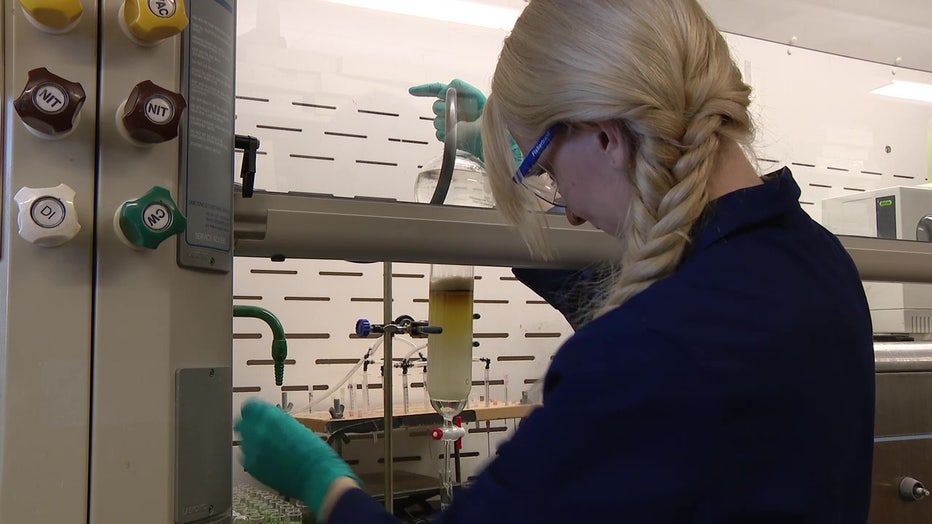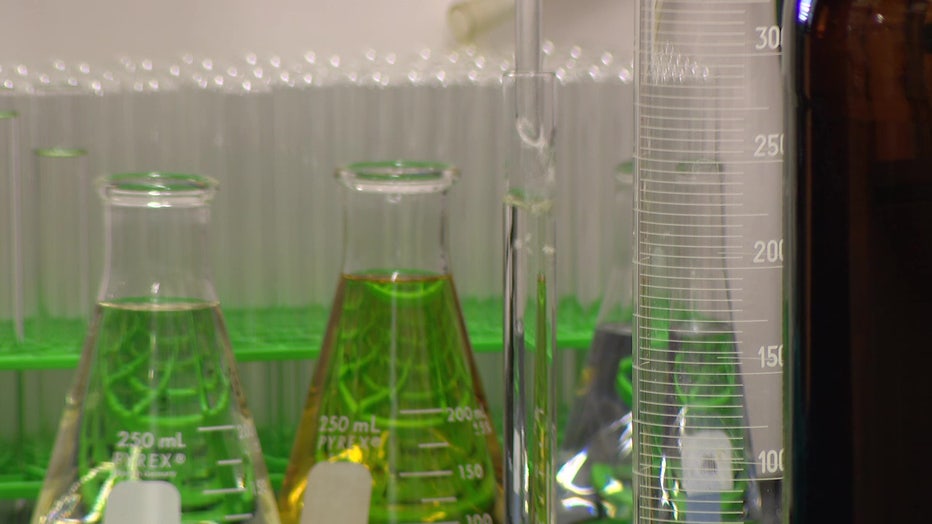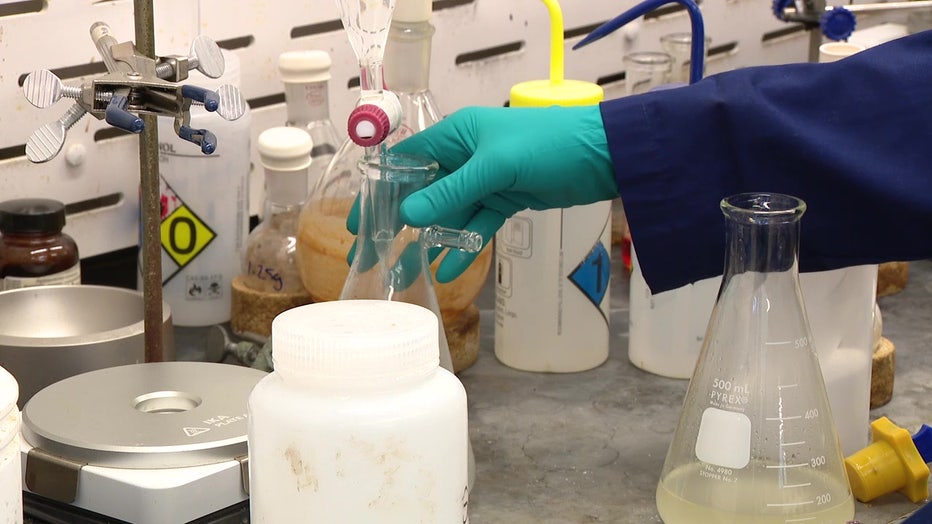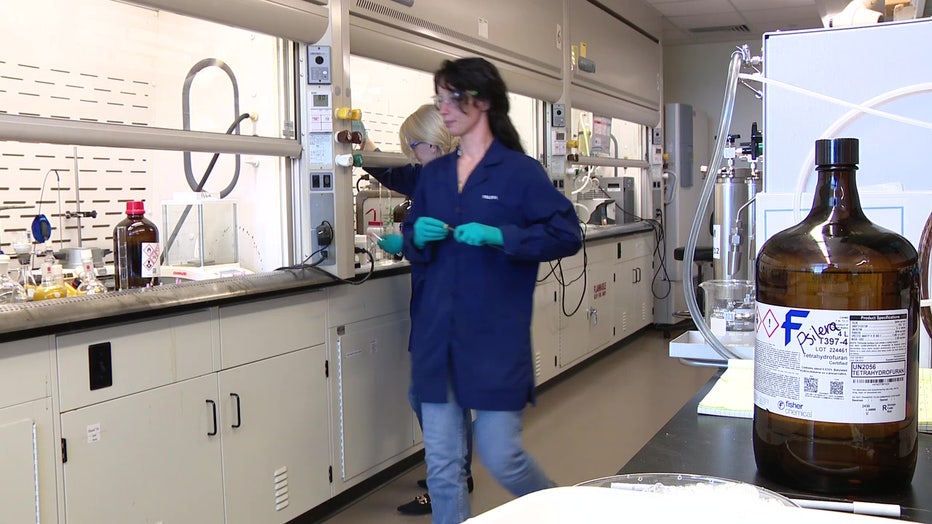Tampa biotech company developing non-hallucinogenic psychedelics to treat mental health disorders

Bay Area company to treat vets with psychedelics
Many veterans are traveling overseas to receive psychedelic-assisted therapy to treat PTSD because the drugs are illegal in the United States, but there is a push to make changes.
TAMPA, Fla. - A Tampa biotech company hopes to be on the verge of a mental health breakthrough with its research into psychedelic drugs. Psilera is working to develop non-hallucinogenic medications that can be used to treat a wide range of mental health disorders.
Psilera founders Jackie von Salm and Chris Witowski say their research is inspired by a long-felt frustration with commonly prescribed neuropsychiatric medications and stagnation in the development of new treatments.
"We have conversations all the time with people that just don't have adequate care for their mental health disorder. I have watched family members struggle on and off for decades taking all different types of antidepressants, which typically take six weeks to take effect and may not even ultimately work for the patient," shared Witowski. "Psychedelics work in 24 hours and they completely curb depression about 60 percent of the time in patients, and these patients are in remission for months and years."
In addition to promising signs in treating mental health disorders, von Salm and Witowski say their psychedelics have shown to be highly effective in addiction treatment.
"These compounds work similarly across not just alcoholism, but also opioid use disorder, and nicotine addiction. So it's not just one modality. It can be used across many, many different areas of addiction," explained Witowski.

A scientist in a Psilera lab.
By removing the hallucinogenic properties of drugs like LSD, MDMA, and psilocybin, also known as magic mushrooms, von Salm and Witowski hope to remove the potential of unpleasant side effects and create more approachable versions of psychedelic neurotherapeutic drugs.
READ: First legal mushroom dispensary in U.S. opens in Ybor City
"These drugs have been around for a very long time and as we work on them to create a more medical pathway and have these medications be available to patients, we want to make sure that the patients are not fearful of even trying the medication," explains von Salm.
Psychedelics have been used for medicinal and spiritual purposes for millennia, but in the mid-20th century, scientific exploration exploded thanks to a pair of Harvard psychologists’ research into LSD.
The drug quickly became associated with the counterculture movement and recreational use revealed their potential for dangerous side effects and abuse.
By the 1970s, research into psychedelics ground to a halt. Harvard psychology professors Timothy Leary and Richard Alpert, who’d famously advised the hippie generation to "Tune In, Turn On, and Drop Out", were expelled from academia. The U.S. government cracked down on the drugs, and psychedelics like LSD and psilocybin became classified as Schedule I, meaning federal regulators define them as having no accepted medical use because of their potential for abuse.

Psilera hopes to remove the hallucinogenic properties of drugs like LSD, MDMA, and psilocybin, also known as magic mushrooms,
According to Witowski and von Salm, blacklisted drugs that had shown promise to effectively treat a range of psychiatric and cognitive disorders.
"Mental illness is not a problem that's going away. It's actually getting worse. If we don't tap into the potential that these drugs have, I mean, there's literally just innovation and promise sitting on the sidelines," said Witowski.
Over the last decade, increased interest in psychedelics, and their potential for treating mental illness, has emerged from an unexpected corner: the veteran community.
"On a daily basis, I'm speaking to veterans who have experienced psychedelic-assisted therapy, primarily outside this country, and it's been a lifesaving experience with the medication they've received," shared Lt. Gen. Martin Steele and Chief Executive Officer of Reason for Hope.
For nearly a decade, Steele has been one of the loudest voices advocating for medical and drug reform in response to rising veteran suicide rates.
The Office of Veterans Affairs estimates 17 veterans die by suicide on a daily basis in the United States. Outside researchers caution the VA’s figure excludes overdose deaths, and suggest the number could actually be closer to 44 veteran suicide deaths a day.

Psilera founders say blacklisted drugs that had shown promise to effectively treat a range of psychiatric and cognitive disorders.
Steele says government restrictions placed on certain treatments, like psychedelics, are failing our veteran community.
"My sense was that SSRIs [selective serotonin reuptake inhibitors] and the continuation of what I pejoratively call ‘a bag of drugs’ being distributed to our veterans at VAs across the country was not going to answer the requirements for their mental health issues for all of those who participated in the global war on terror," recalls Steele. "The success rate of commonly prescribed treatments is very low, in my humble opinion. We can't afford to continue to think by providing those types of medications that we're going to get a different result and mitigate against not only suicide, but the challenge we face in regards to healing in the mental health arena."
READ: USF and Crisis Center team up for free classes on mental health in the workplace
The Vietnam veteran has now made it his mission to convince lawmakers to re-classify certain psychedelics in order to promote research into potentially life-altering medications.
"Schedule one research is so onerous and so restrictive," said Steele. "Moving psychedelics to Schedule II will just open the floodgates for scientists to be able to do the research."
The Psilera founders say their early research has shown myriad benefits and work in a fraction of the time required by current treatments for depression.
"They work within minutes for depression, for anxiety, for addiction disorders, and they do this without hallucinations," said Witowski.

Meanwhile, on Capitol Hill, Steele’s advocacy has led to the Breakthrough Therapy Act, a bipartisan bill sponsored by Senators Rand Paul (R-Kentucky) and Cory Booker (D-New Jersey) that would remove some of the regulatory hurdles surrounding psychedelic research and treatment.
As he’s testified multiple times to congress, Steele is convinced psychedelic therapy is a game-changer for veterans suffering from PTSD.
READ: How magnets are helping treat depression and anxiety
"The evidence is clearly in because over 1,000 veterans have had to go outside our country, which to me is unconscionable, to be able to get treatments in Mexico, Costa Rica, Central and South America, to get treatments using these medicines. Many of these veterans were at the end of their rope and near suicide, but the treatment resulted in a complete change of life. One treatment has a profound effect on their well-being and their mental health," stated Steele. "When someone calls me and says, ‘Thank you, General, for saving my life,’ that means all the difference in the world."
While Congress considers the regulatory changes, Psilera is currently seeking FDA approval and hopes to begin the first clinical trials of their non-hallucinogenic medications at the start of next year.

